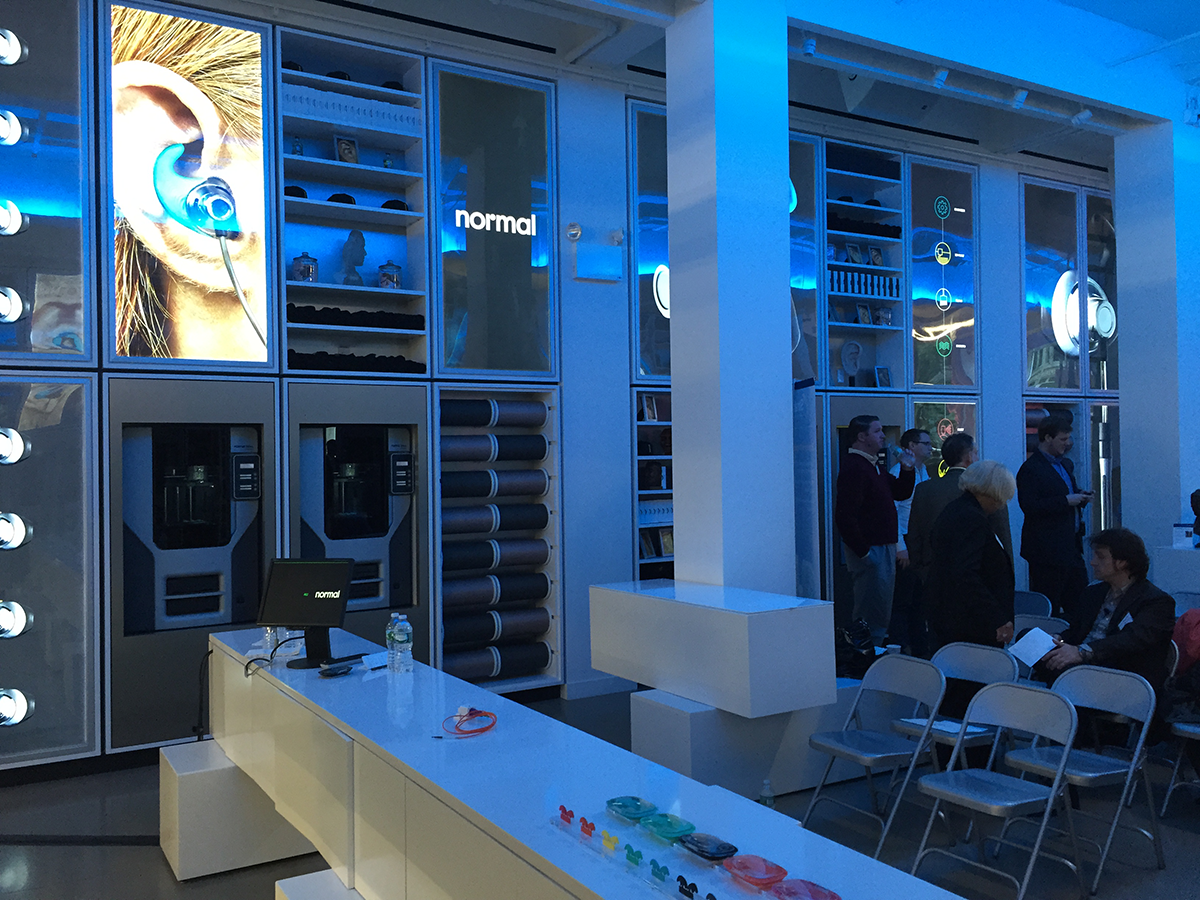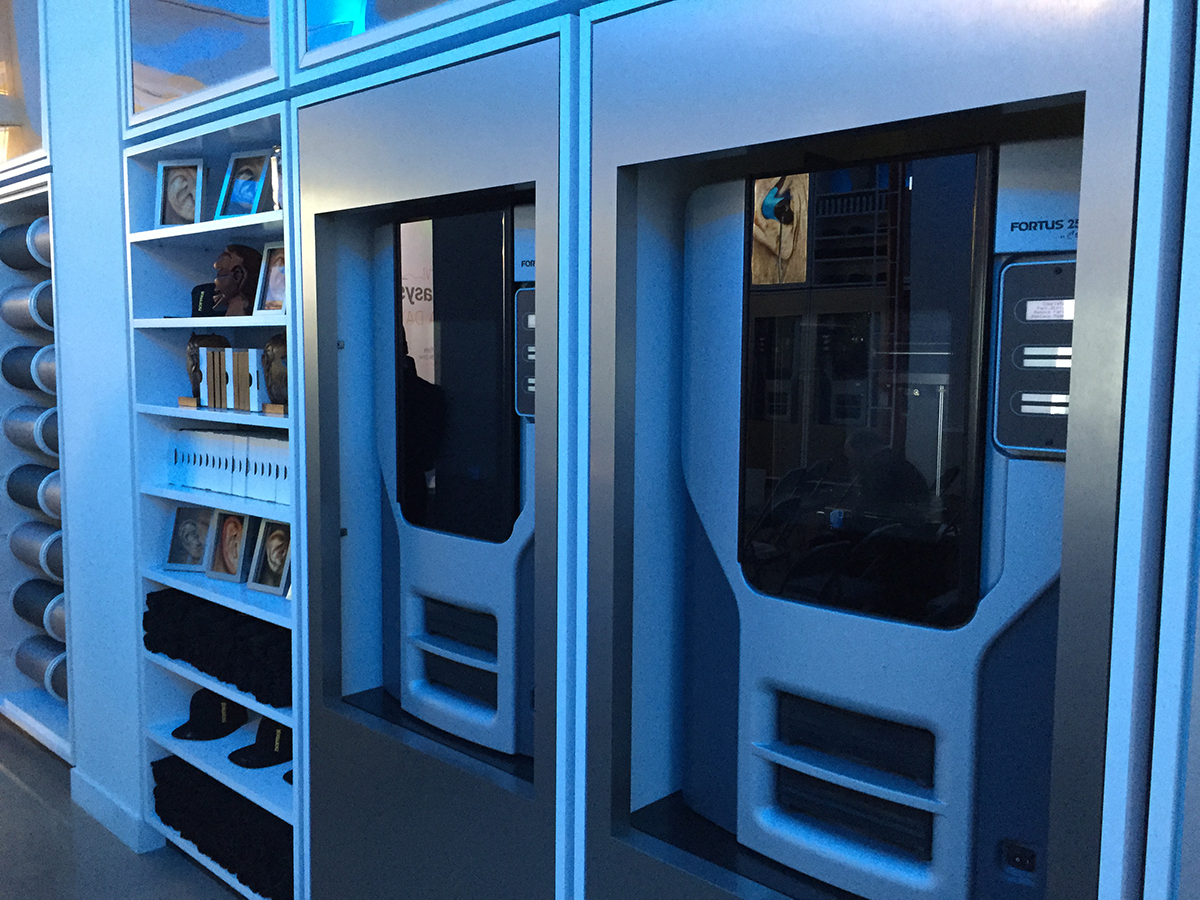When you walk into the Normal Store in downtown Manhattan and admire in awe its futuristic retail space, with 10 Fortus 250 3D printers inside the walls, and look through the windows on its finishing factory, you cannot help but wonder one thing: how can they pay for all this by producing and selling $199 custom earphones?
I had the chance to ask this question of Nikki Kaufman, the explosive CEO, founder and visionary behind the Normal Store and her answer was… “Of course… we do not disclose exact numbers on revenues.” Of course! What she did say is that they opened in August and that they are extremely happy with the way things are going. But then, if you were running one of the coolest stores in the world you probably would be too.
The Normal Store is not just a futuristic store. It is also a factory in downtown Manhattan. It represents a future where the factory will be part of the store, so that a consumer can get custom made products. In other words it is a future based on the past. A past before the Ford T, before the assembly line, before the industrial revolution. A future based on a past where things were all made to fit, where small, medium and large sizes did not exist. Only in this future 3D printing will make it possible for us to have modern, technologically advanced goods made to fit like a (tailor made) glove.
Doing something like this — this advanced, this large, in this location — is not for everyone. Even David Reis, Stratasys’ CEO, recognized it takes some highly developed organizational and entrepreneurial skills to achieve it. And also some serious fund raising skills. “I was able to raise money from investors and business angels to make this possible, however Stratasys has been very supportive. This is basically a showroom for their machine’s potential and they helped us set up the structure that makes this on-demand customization process possible and truly accessible to the consumer.”
The Normal Store uses its 10 Fortus 250 3D printers to make custom earphones, tailor made for each customer’s specific and unique ear shape, using only a picture (taken in the store or through the iPhone app and sent in). It 3D prints them in ABS, using seven different colors co-developed with Stratasys specifically for the Normal Store’s needs. The entire process, from design, through manufacturing, to finishing is carried out on the Manhattan premises.
“We are very happy because we think that $199 is a price that is affordable to most consumers and can easily go up against other premium earphone sets,” Nikki told me. Although she speaks faster than a regular person can think (which is typical of people who don’t just have ideas but make them actually come true) she seems to have a very clear idea of what she wants to accomplish.
“I knew from the beginning that we had to use the Fortus 250’s, which I had already worked with during my time at Quirky – she explains. First of all because they offer a very high resolution, which is a feature compatible with the products we produce. Second because they are ridiculously easy to operate. You just open the front and take the plate out. Third because they lend themselves to the retail factory floor’s look and help us meet the high demand that we get, receiving orders from all over the United States”.
That’s how Nikki defines her flagship/pilot store, as a “Retail Factory” but since it is a factory and it does have 3D printers can it become an “anything factory”? Once again Nikki gave me a lesson in successful entrapreneurial focus. “Right now we are focusing on making the best headphones we can. However – she added – the store’s name is normal and our tagline is ‘One size fits none’: this means that we certainly do see a potential for more products down the line.”
These could be custom made hearing aids – a huge potential market – but also products that are radically different from headphones. They will not, anytime soon, be based on other technologies such as 3D scanning or Polyjet. “We are very happy with the system we have developed, which gives us sufficient guarantees in terms of production times and product quality.” Consider all possibilities but focus on what you are doing, that is the key to a successful 3D printing based business. A 300 square meters futuristic retail factory in downtown Manhattan doesn’t hurt either.




